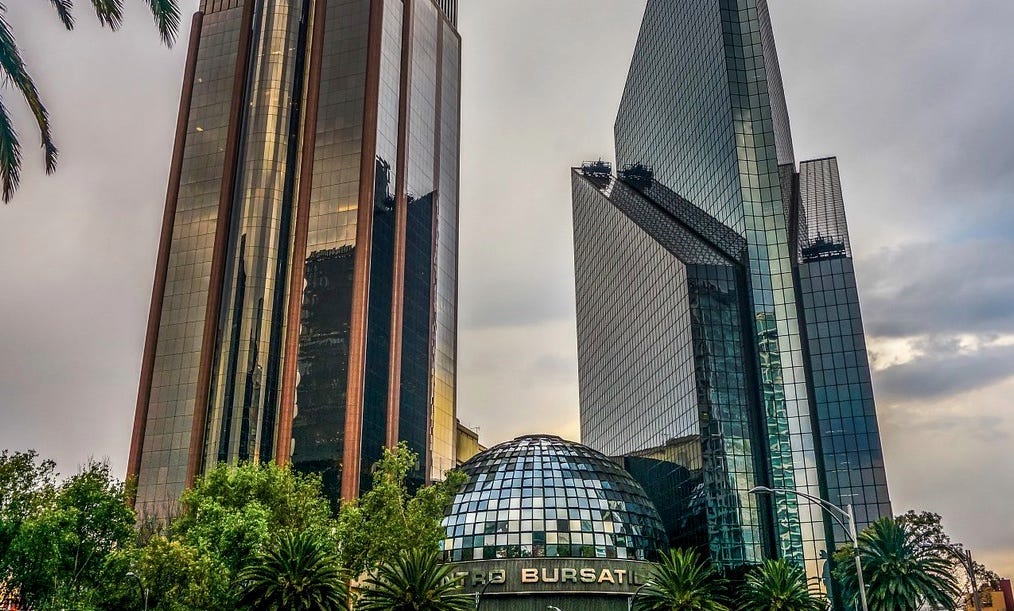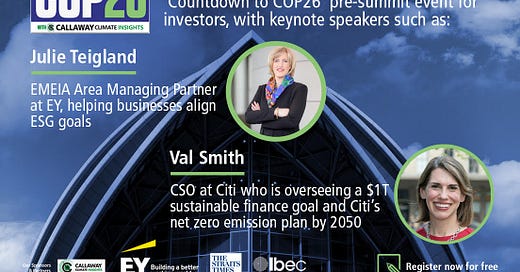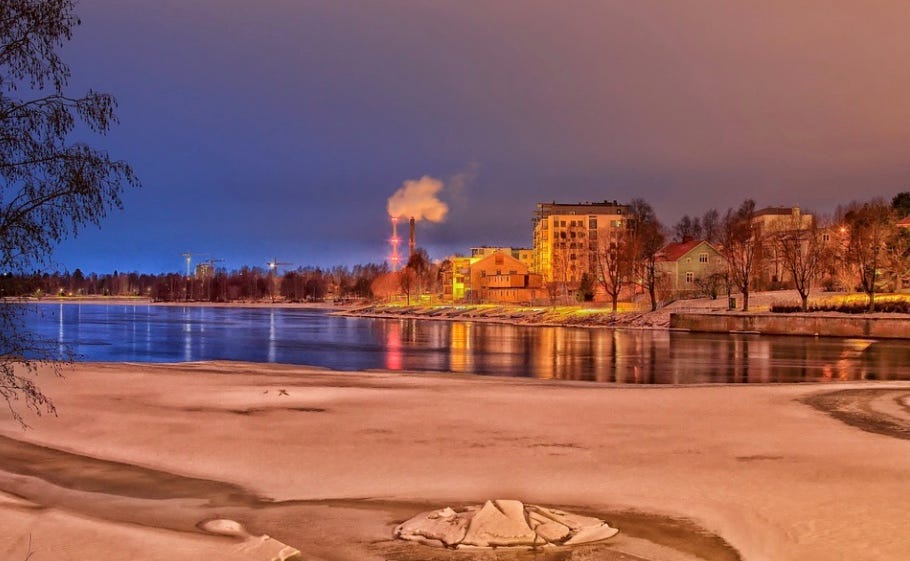Energy crises in UK, China spur climate backlash as Biden plan hits 11th hour
Welcome to Callaway Climate Insights. Only seven days until our signature investor event, Countdown to COP26. See details and register for free below.
Callaway Climate Insights publishes Tuesdays and Thursdays for everybody. To get our insights and analysis every day, please subscribe.
Don’t miss our special Countdown to COP26 event Oct. 7
Callaway Climate Insights is proud to host ‘Countdown to COP26: everything investors need to know about the world’s most important climate summit,” on Thursday, Oct. 7, at 9 a.m. Eastern. Speakers include Citi Chief Sustainability Officer Val Smith, EY’s Julie Tiegland, investors Jeff Gitterman and Tim Dunn, and Hannon Armstrong CEO Jeff Eckel. Get more information and register for this free event here.
Wrenching energy shortages in the UK and China this month are causing a backlash against international climate efforts at precisely the wrong time for President Joe Biden, as his goal of passing a massive infrastructure spending bill is hanging by a thread in Washington D.C.
At stake is the Clean Electricity Performance Program (CEPP), which is a centerpiece of the legislation and is designed to push utilities to transition to renewable energy from fossil fuels faster. In the absence of reliable information about coal prices and natural gas supply in both the UK and China, anti-climate forces are seizing on public anger by saying new climate regulations are to blame for blackouts and long lines at petrol stations.
While Biden and the Democrats will likely find a way to push through a reduced form of the infrastructure reconciliation package, in time for the UN’s COP26 global climate summit next month, it is sure to leave all sides angry and demoralized. Failure to push through anything at this point would seriously threaten the Biden Administration’s entire agenda as a catalyst for change after the Trump years.
Like it or not, the international climate debate has shifted from one of arguing over the existence of climate change to arguing over whether our efforts to mitigate it ultimately will destroy global economies and markets. Before the climate can itself.
More insights below. . . .
Don’t forget to contact me directly if you have suggestions or ideas at dcallaway@callawayclimateinsights.com.
EU Notebook: Brussels to issue battle plan for energy price spikes, gas shortages
. . . . A top EU official said this week that the European Union would soon issue guidelines, including tax changes and consumer subsidies, to member governments to help them through what is expected to be a long winter of energy shortages and soaring prices. Already, gas lines in the UK are turning violent, and the continent is facing similar strife. The outlook for energy businesses may be even worse . . . .
In Mexico’s incredible shrinking stock market, is ESG to blame?

. . . . Mexico’s stock market is shrinking, and some are blaming ESG. Amid a dearth of IPOs and the delisting of many major companies due to lack of retail investor cash and high regulatory costs, the added bureaucracy of establishing sound environmental, legal and governance practices is proving a convenient scapegoat for those who want to blame climate advocates. . . .
Thursday’s subscriber insights: The Asian coal challenge; plus how’s your roof this summer?

. . . . When it comes right down to it, climate change will not be tempered unless Asia cleans up its act. Asia Research & Engagement (ARE) has established a beachhead in Singapore to bring together a group of six investors with a combined $4 trillion of assets under management, including Fidelity International, to make it happen. Money talks, but stepping up engagement with big Asian companies like banks and energy producers can only go so far on carbon and coal. Read more here. . . .
. . . . Tesla has huge capitalization. VW says it will be the EV No. 1. Ford just invested $11.4 billion in battery and EV plants. And there’s much more. Are we going to a shakeout like the tech crunch of the late ’90s? There are opposing views. Read more here. . . .
. . . . Ford has one coming soon. So does GM. Electric vans, that is. But they have been beaten to the punch by Indiana startup Electric Last Mile Solutions, where the vehicles are now rolling off the line. There are also other vans coming from other startups, such as Arrival Ltd. and Canoo Inc. Why the van craze? Read more here. . . .
. . . . Building materials. New technologies. Insurance costs. Prices for everything related to buying a home are set to go up because of climate change. Here are some of the factors to figure on, and profits to be made, from the coming surge. Read more here. . . .
Editor’s picks: Battery storage pairs with solar; Kentucky’s first carbon-neutral distillery
Watch the video: From CNBC, this special report on how climate change is wreaking havoc on American homes.
Most planned U.S. battery storage additions to be paired with solar
Of the 14.5 gigawatts (GW) of battery storage power capacity planned to come online in the U.S. from 2021 to 2024, 9.4 GW (63%) will be co-located with a solar photovoltaic (PV) power plant, based on data published in the U.S. Energy Information Administration’s Annual Electric Generator Report. The EIA says another 1.3 GW of battery storage will be co-located at sites with wind turbines or fossil fuel-fired generators, such as natural gas-fired plants. The remaining 4.0 GW of planned battery storage will be located at standalone sites. Historically, most U.S. battery systems have been located at standalone sites. Of the 1.5 GW of operating battery storage capacity in the United States at the end of 2020, 71% was standalone, and 29% was located onsite with other power generators.



Diageo completes carbon neutral distillery
Diageo (DEO), owner of Johnnie Walker Scotch whisky, has opened its first carbon neutral whiskey distillery in Kentucky, one of the largest of its kind in North America. The new 72,000-square-foot facility is in Lebanon, Ky. It will operate using 100% renewable energy, the company says. The site is expected to produce up to 10 million proof gallons per year without using fossil fuels for production, The Spirits Business reports. Perry Jones, president of North America supply for Diageo, said: “Two years ago, we set a vision and commitment to build our first carbon neutral distillery in North America.” Diageo, which also owns Guinness and Bailey’s, aims for net-zero carbon emissions from all direct operations by 2030.
Latest findings: New research, studies and projects
Climate stress testing
In this Federal Reserve Bank of New York staff report, the authors write that climate change could impose systemic risks upon the financial sector, “either via disruptions in economic activity resulting from the physical impacts of climate change or changes in policies as the economy transitions to a less carbon-intensive environment.” Authors Hyeyoon Jung, Federal Reserve Bank of New York; Robert F. Engle, New York University and National Bureau of Economic Research (NBER); and Richard Berner, Leonard N. Stern School of Business, NYU developed a stress testing procedure to test the resilience of financial institutions to climate-related risks. Specifically, they introduced a measure called CRISK, systemic climate risk, which is the expected capital shortfall of a financial institution in a climate stress scenario, and use the measure to study the climate-related risk exposure of large global banks in the collapse of fossil-fuel prices in 2020. Read more on this research at SSRN.
More of the latest research:
Words to live by . . . .
“Here we are with these sentinels to our history. You’ve got trees that quite literally date back to over 3,300 years ago. You can’t rebuild a giant sequoia … and that’s why we’re here with a deep sense of urgency.” — California Gov. Gavin Newsom, referring to current wildfires threatening Sequoia National Park.







